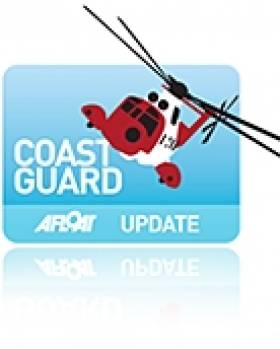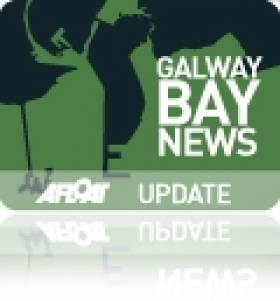Displaying items by tag: Search
Search Continues For Missing Man Off Clare Coast
#Missing - Searching resumed this morning (Tuesday 27 October) for a 19-year-old Clare man feared to have fallen into the sea.
The Irish Times reports that the man from the Quilty area was last seen on Sunday night (25 October) at the rear of his coastal home.
A cross-agency emergency response began yesterday (Monday 26 October) after the alarm was raised in the morning, covering the coastline between Quilty and Spanish Point in Co Clare.
Conditions have been hazardous in recent days, and Kilkee Coast Guard advises the public to "exercise extreme caution" by the sea till the weather improves. The Irish Times has more on the story HERE.
Search Resumes After 'Body Part' Spotted In Water Near Ardnacrusha
#Search - TheJournal.ie reports that the search is continuing today (Wednesday 14 October) for a body seen in the water near Ardnacrusha power station.
A passer-by spotted what they believed to be a body part floating in a canal near the Co Clare ESB plant yesterday afternoon, and emergency services responded immediately, with Limerick Marine Rescue Service sending out two diving teams.
The cross-agency response, involving Shannon's Irish Coast Guard helicopter Rescue 115 and Killable Coast Guard, resumed at first light this morning.
Bodies Found In Search For Missing Trawler In English Channel
#Missing - BBC News reports that two bodies have been recovered from the sea in the search for four fishermen whose trawler went missing in the English channel this week.
Lifeboat crews from Dungeness, Dover and Hastings RNLI stations yesterday (29 January) resumed their part in a major search for the Belgian fishing boat, which vanished from radio contact on Wednesday (28 January) some 10 miles south of Dungeness.
They joined search and rescue helicopters, vessels from the French authorities, a Trinity House boat and several other fishing trawlers in what was expected to be "a long, protracted search of the channel", according to RNLI divisional operations manager Allen Head.
At 3pm yesterday debris was identified 20 miles southeast of Dungeness, in French territorial waters, and the lifeboats continued to search the area until they were recalled by the coastguard.
However later in the evening two bodies were discovered in the sea off Boulogne in northern France, some 30 miles across the channel from Dungeness. BBC News has more on the story HERE.
Surfer Found Safe And Sound In Lahinch Beach Search
#Coastguard - The Clare Herald reports on the happy outcome after a search for a missing surfer near Lahinch yesterday afternoon (Monday 15 December).
Members of the Irish Coast Guard's Doolin unit began combing the beaches of Lahinch after an emergency call from a concerned family member.
But the surfer was quickly locoed safe and well just south of the Co Clare town, a popular surfing hotspot even in winter.
Body Found In Search For Missing NI Angler In Lough Ree
#LoughRee - A body has been found in the search for a Northern Irish angler missing for more than two weeks in Lough Ree, according to TheJournal.ie.
As reported four days ago on Afloat.ie, Daryl Burke had not been seen since the boat he was travelling in with two angling colleagues David Warnock and John Trimble overturned not far from Hodson Bay outside Athlone, Co Westmeath on the afternoon of 20 March.
Warnock and Trimble were rescued in the emergency operation that launched immediately after the incident, but Warnock died in hospital some hours later.
This week the search for Burke was concentrated on the area where the trio's boat was recovered undamaged.
And it's now being reported that a diving team from Boyne Fishermen's Rescue and Recovery Service discovered a body in a part of the lough known as The Wall yesterday afternoon (Saturday 5 April).
TheJournal.ie has more on the story HERE.
#LoughRee - Belfast's News Letter reports that the boat carrying three anglers that capsized in Lough Ree nearly two weeks ago has been recovered as the search continues for one of the party.
Daryl Burke has not been seen since the boat he was travelling in with angling colleagues David Warnock and John Trimble overturned not far from Hodson Bay outside Athlone, Co Westmeath on the afternoon of 20 March.
An eyewitness to the incident told of a "freak accident" as the three friends' boat fell victim to a sudden squall on the lough amid conditions described as "nasty" but "not particularly wild".
Warnock, 27, and Trimble, 60, were rescued from the water after an emergency operation was immediately launched. Trimble is now in recovery, but Warnock died in hospital some hours after the incident.
It's being reported that Naval Service and Garda divers are concentrating their search for Burke on the area where the boat - a 12m open-hulled vessel with an outboard motor - was recovered undamaged.
The News Letter has more on the story HERE.
Search Continues For Missing Man As Body Found Off Sheep's Head
#Search - BreakingNews.ie reports that a body has been found in the search for two men missing on Sheep's Head in West Cork.
The remains have not yet been identified, but are believed to be one of two visitors - a Dutch national whose family have a home near Kilcrohane, and his German national friend - who went missing on Saturday 8 February after informing family back home they were going for a walk to a nearby lighthouse.
Weather conditions on the day deteriorated quickly as Met Eireann issued one of an extended series of warnings for coastal areas.
The search continues for the second missing man, with operations co-ordinated by Naval Service vessel LE Emer, according to RTÉ News.
Divers Find Body In Search For Missing Angler
#NewsUpdate - TheJournal.ie reports that Naval Service divers yesterday recovered a body from the sea off Co Clare during the search for a missing fisherman.
As reported Monday on Afloat.ie, the Latvian national was angling with friends near Fanore when he was swept off the rocks by an unexpected wave.
A major search and rescue operation was launched soon after but interrupted due to adverse weather and sea conditions on Sunday evening and Monday afternoon.
However, divers retrieved a body from the water some two hours into the resumed search yesterday morning (Tuesday 8 October). Formal identification of the remains is pending.
Search For Galway Man Extends To Coastal Areas
#GalwayBay - Galway Bay FM reports that the search for a missing Galway man has been expanded to a coastal search.
Tom Ward, 39, was last seen in Galway city centre on 7 February, and was reported missing by his family 10 days later.
Gardaí stepped up their search to the shoreline areas of Galway Bay adjoining the city earlier this week, enlisting Civil Defence volunteers to search as far as Kinvara in the south-east corner of the bay.
Search for Missing Kayaker to Continue in Kerry
#NEWS UPDATE - Breaking News reports that the search for a 38-year-old man who went kayaking near Cromane in Co Kerry in the early hours of yesterday will resume this morning.
The alarm was raised yesterday morning after the man - named locally as Nealie O'Connor, and the father of a two-month-old baby - failed to return from his lake kayaking trip.































































